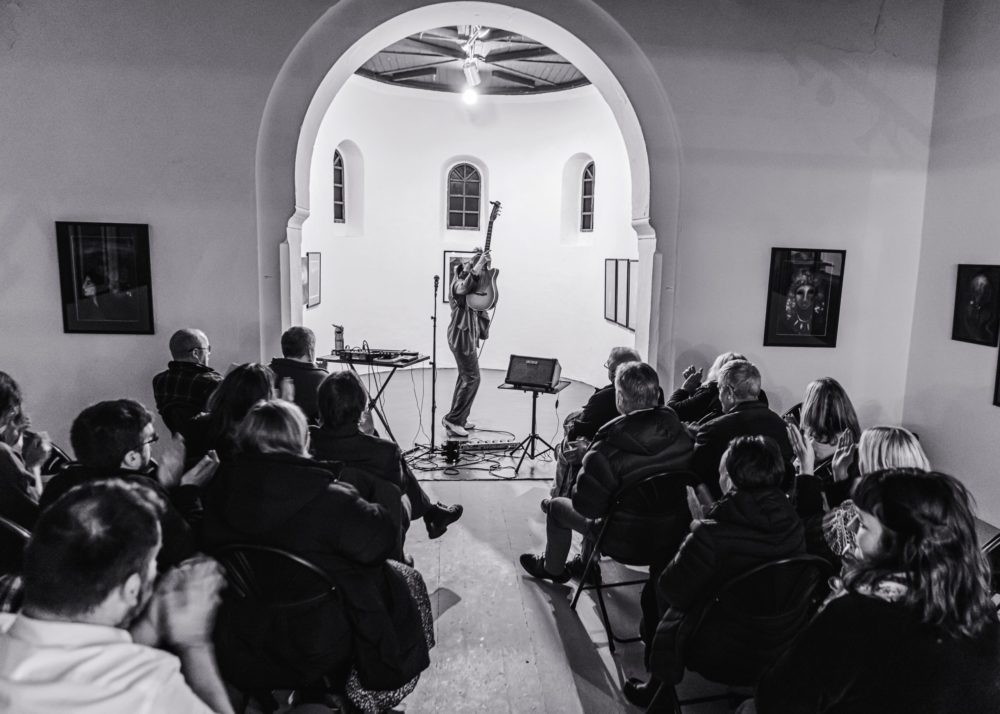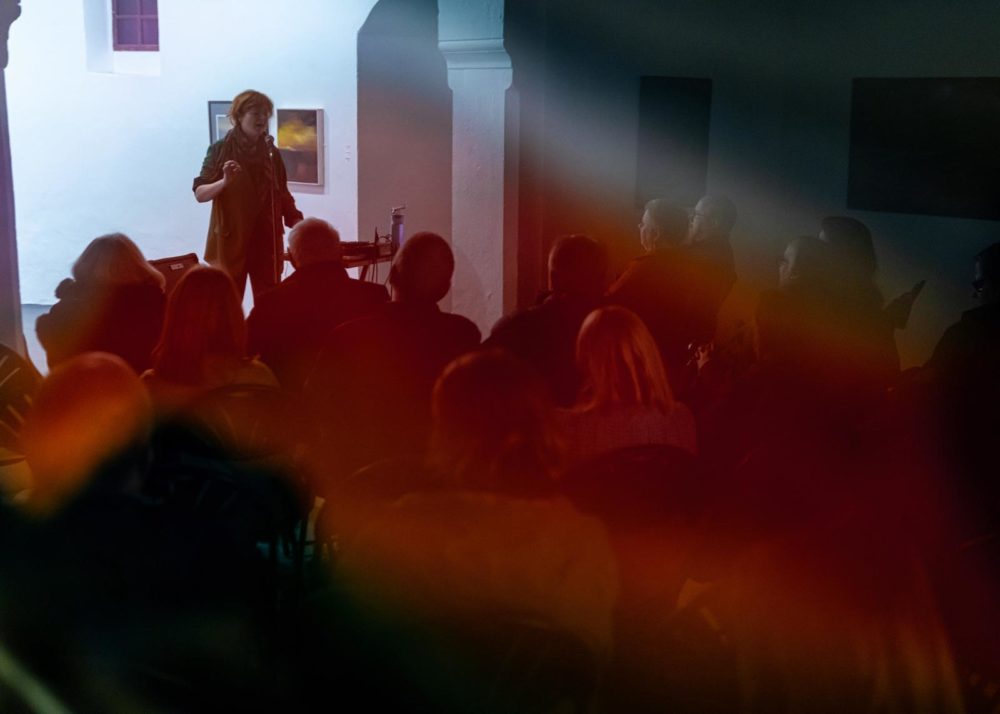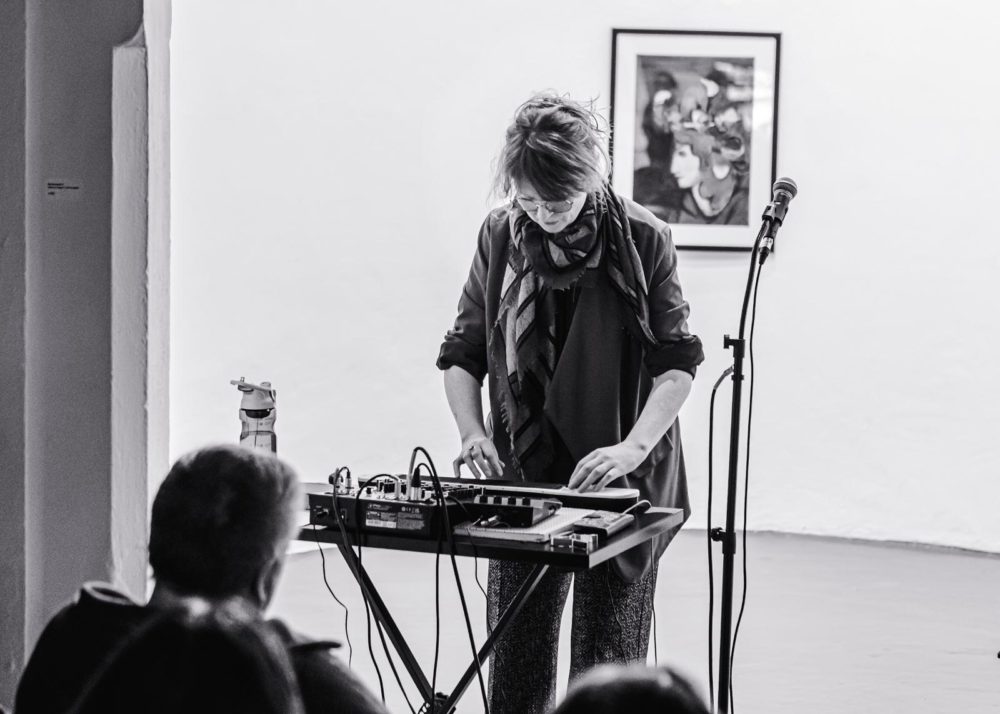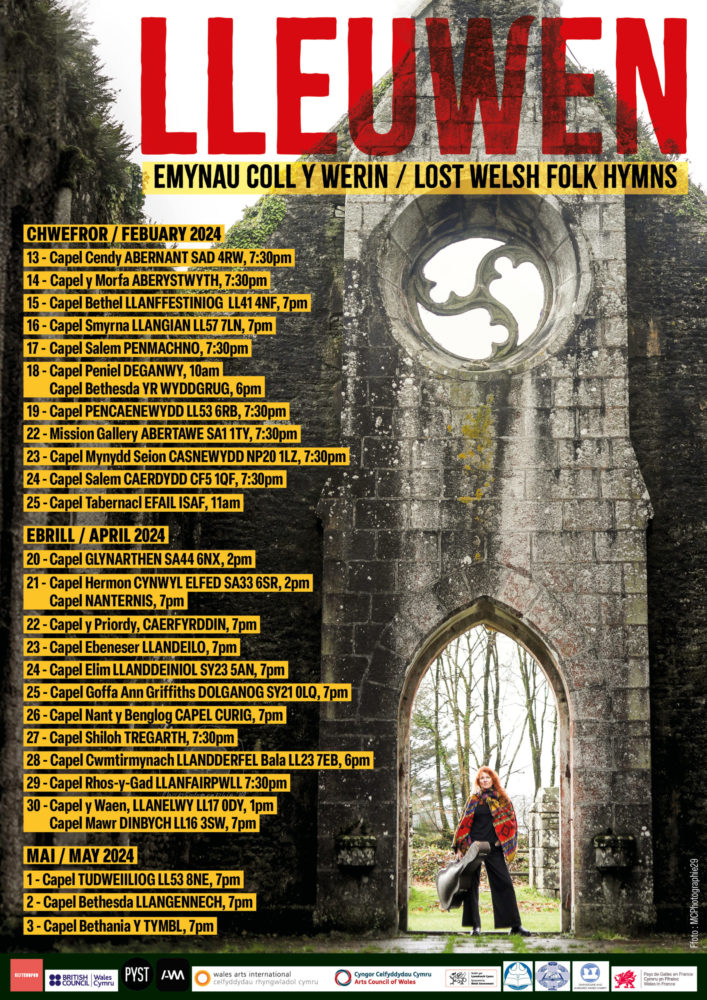Ancestry and innovation: Lleuwen’s groundbreaking chapel tour

Stephen Price
Before entering Newport’s Capel Mynydd Seion on Friday 23 February for a concert that will go down as one of the most stirring and extraordinary one (wo)man shows I have ever and will ever witness, I solemnly swore to be in the moment.
To take in the music. To take no notes or photos and be present.
I planned no review, so this is simply a response.
Poetry
My expectations were high following only snippets of interactions with Lleuwen over email.
Her interview struck many a chord with me. A childhood of playing violin at my family’s chapel in Brynmawr, my mum a rebellious Presbyterian minister, a shared love of scripture and poetry and community and hymns but a double bagged binning of doctrine and condemnation.
And so it was – late as usual, I sat at the back just as Lleuwen was introduced by the personification of chapel kindness.
Lleuwen’s first concern before beginning was to check the Welsh proficiency of the audience.
Asked to raise our hands if we needed English translations, we all kept our hands lowered – in most cases through fluency, but in many cases through a simple desire to experience the moment as intended.
For the handful of people in attendance with only a small knowledge of Welsh, the lyrical, melodical, utter beauty of the poetry and language was no less powerful – perhaps even more so.
Archival made timeless
As part of the preparation for Lleuwen’s intimate chapel tours – this ‘homecoming’ of sorts, Lleuwen spent a great deal of time at the sound archive at St Fagans Museum to listen to Welsh folk tunes.
She told us: “It wasn’t the recordings of folk tunes that caught my attention but it was these recordings of hymns that I had not seen in the hymn books.
“After further research, I learned that some of these hymns were not in the old editions of the hymn books either. No one knows who wrote them but we know they were loved enough to be passed on from generation to generation.”
Expectations
Back to my expectations of the night. They were high. I expected Lleuwen to sing a series of lost hymns, or takes on them, with guitar or other instrument and to get on my way before too late for an early night.
I knew we’d all be presented with archival music, but its presentation was my first surprise of the evening.
We were in an old chapel – pulpit, pews, a time capsule of scent stirring familiarity, but Lleuwen’s ‘kit’, particularly her samplers and musical methodology were more reminiscent of the likes of Moby and PJ Harvey.

What she did with this kit, I have never seen or heard before.
I am loathe to give too much away for future witnesses of her tour, but I had no idea that the actual voices from the past that Lleuwen researched and ‘unearthed’ would be joining us that night.
This night wasn’t simply a ‘performance’ of a few ditties. This was clever stuff.
Archival recordings of song and word interspersed with Lleuwen’s singing. Acapella voices given new melody. Snippets, spoken (sometimes gently, sometimes boomed) off the cuff by men and women long gone, repeated and made into music of innovation and modernity.
Hwyl Gymreig
The setlist included multiple aspects of the Welsh hymn tradition such as examples of “Canu Pwnc” that dates back to the time of the monks – where people would sing parts of the scriptures.
Lleuwen also introduced us to examples of “Plygain” and the “Hwyl Gymreig” which are a type of half sung, half spoken sermons.
The Hwyl Gymreig in particular, blew me away. An almost frantic, giddying and ‘foreign-to-me’ way of sing-speaking that I can imagine would send its singers into a euphoric spiritual high.
I have personally never heard anything like it.
Lleuwen told us previously: “These sermons are unlike anything I have ever heard before. Mindblowing.
“I have also been introduced to recorded memories of the 1904/05 revival. If these memories were documented in written form, one could only read the words. But with audio, the emotional recall within voices is captured.”
The joy of the Welsh language was front and centre too – its previous custodians knew how to play with rhyme and sound and alliteration in a way that the whole world would be envious of. If they only knew who we were.
Folk hymns
Welsh folk hymns. What are they? The traditional hymns of Wales – we don’t know who wrote them or which part of Wales they are from originally. They have been passed on orally rather than via the official hymn books. They are the unchosen – were excluded by the hymn book committees of their time
Would that be because of their content? It’s interesting to note perhaps that many of the hymns in the set talk of mental health struggles, addiction and recovery.
For example, a hymn sang by Bertie Stevens of Llangeitho. This is a hymn that sings to one’s own conscience. “O gydwybod Gad fi’n llonydd” – “Dear Conscience, leave me alone.”
Also the hymn ‘Seler Duw’, which was collected by Robin Gwyndaf from St Fagan and dates back to the 1790s, is written from the perspective of an ex addict talking about transitioning from alcoholism to “being drunk on God and the wine of his cellar”.

Dagrau/Tears
After Lleuwen’s final song and a final heartfelt, and in many cases tearful, round of applause (which will never feel right to any current or former chapel attendee, try as we might) I wondered if I should hang on for a moment and gush about how moved I was.
I had to.
After much babbling on my part, Lleuwen told me: “Eventually I am going to name this project Tafod Arian.
“It means Silver Tongue …. I have recordings of various people speaking about seeing silver tongues falling from the skies during the time of the 1904 revival.
“It was a common vision during the 1859 revival too according to some of these voices who were recorded”.
I pushed no further. Asked no more about what’s coming next. But if this profoundly moving and groundbreaking music does make it to a format outside of the tour then Wales will be better for it.
A documentary series? Yes please.
Legacy
The drive home served only to prove the profound nature of what Lleuwen had just presented.
My mind awash with ‘what did I just witness?’
‘Whose voices were these?’
‘Why did we let all this go?’
I thought of chapel as community hub – as family and friend – once the heart of community and cultural life and support, and how nothing like it exists today when we perhaps need it most.
Not the religious side, of course, but the binding side of it, the overarching un-exclusionary aspect of it – something a ‘community centre’ and committee can never emulate.
As my thoughts formulated and then crystallised, my overriding take from the night was how important this project is and will be for Wales, and for the legacy of our lost music.

For one, the spoken voices and styles used – they’re gone now.
No one sings, or perhaps even speaks, a Welsh like this any more. We need to remind ourselves of the very nature of our indigenous language – it’s both ‘other’ and ‘us’ – and we must do all we can to keep it alive and unapologetically different.
Hearing the voices of peoples past made me recall older people speaking with accents and tones and melody that my generation just don’t have. And the word ‘indigenous’ kept coming to me again and again that night.
This is the sound of our land. The music of our land.
Academia
At best, we could read an academic piece on all of the above, turn the page and forget it.
But dry unmoving words on paper (or even worse, a screen) and theoretical knowledge can only do so much. They can’t bring a deeper, ‘feeling’ understanding.
And so that’s what Lleuwen has done – she has gifted us with a response to her findings, but she is not running with the ball and taking credit – stepping to one side, she is sharing the stage with some of the last people to utter these words and ways.
A channel, for want of a better word.
We are custodians of Wales’ cultural and linguistic legacy now, and you get the feeling that Lleuwen is piecing a potion we should all be paying attention to.
What else have we lost, and will we lose, if we stop paying attention?
Dates of Lleuwen’s remaining performances can be found in the poster below. You can also follow her musical journey via her Instagram and Facebook.

Support our Nation today
For the price of a cup of coffee a month you can help us create an independent, not-for-profit, national news service for the people of Wales, by the people of Wales.






A quite extraordinary evening. I was privileged to be present at the Mission Gallery in Swansea. If you have a chance, go to one of the remaining evenings.I don’t think youwill have heard anything quite like it.